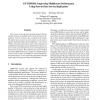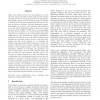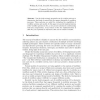160
click to vote
FTDCS
2004
IEEE
15 years 5 months ago
2004
IEEE
Peer-to-peer systems have the desirable property that the amount of resources available in the system increase as demand for services increases due to growth of the system. We exp...
107
click to vote
FTDCS
2004
IEEE
15 years 5 months ago
2004
IEEE
The heterogeneous nature and independent administration of geographically dispersed resources in Grid, demand the need for access control using fine-grained policies. In this pape...
134
click to vote
FTDCS
2004
IEEE
15 years 5 months ago
2004
IEEE
Today most Internet services are pre-assigned to servers statically, hence preventing us from doing real-time sharing of a pool of servers across as group of services with dynamic...
108
Voted
FTDCS
2004
IEEE
15 years 5 months ago
2004
IEEE
The aim of dynamic reconfiguration is to allow a system to evolve incrementally from one configuration to another at run-time, without restarting it or taking it offline. In recen...
118
click to vote
COORDINATION
2006
Springer
15 years 5 months ago
2006
Springer
Abstract. Rebeca is an actor-based language which has been successfully applied to model concurrent and distributed systems. The semantics of Rebeca in labeled transition system is...
145
click to vote
COORDINATION
2006
Springer
15 years 5 months ago
2006
Springer
Mobile ad hoc networks (MANETs) define a challenging computing scenario where access to resources is restrained by connectivity among hosts. Replication offers an opportunity to in...
COORDINATION
2006
Springer
15 years 5 months ago
2006
Springer
Abstract. We present a model for choreography `a la WS-CDL and formalize it in DSTL(x), a spatio
130
click to vote
COORDINATION
2006
Springer
15 years 5 months ago
2006
Springer
Van der Aalst recently proposed a set of workflow patterns to characterize the kinds of control flow that appear frequently in workflow processes. These patterns are useful for eva...
124
click to vote
COORDINATION
2006
Springer
15 years 5 months ago
2006
Springer
In a previous work we have presented a formal framework devoted to show the relevance of choreography and orchestration in the design of service oriented applications. Even if usef...
150
click to vote
COORDINATION
2006
Springer
15 years 5 months ago
2006
Springer
Bigraphical Reactive Systems have been proposed as a meta model for global ubiquitous computing generalising process calculi for mobility such as the pi-calculus and the Mobile Amb...




